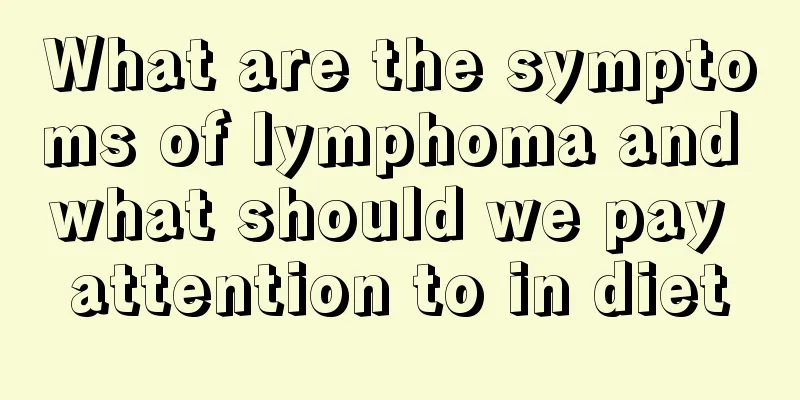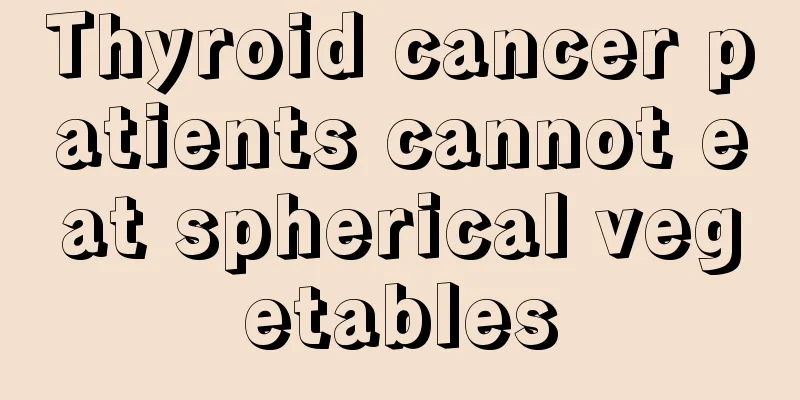What are the symptoms of lymphoma and what should we pay attention to in diet

|
What are the symptoms of lymphoma? What should I pay attention to in my diet? Lymphoma is a malignant tumor originating from the lymphatic hematopoietic system, which is mainly manifested by painless lymphadenopathy, hepatosplenomegaly, involvement of various tissues and organs throughout the body, fever, night sweats, weight loss, itching and other systemic symptoms. According to the tumor cells, it can be divided into non-Hodgkin's lymphoma and Hodgkin's lymphoma. The cause is still unclear. It is generally believed that it may be related to gene mutation, infection with viruses and other pathogens, radiation, chemicals and autoimmune diseases. The symptoms of lymphoma are localized and systemic, with the following specific features: 1. Local characteristics: including superficial and deep lymph node enlargement, which are mostly painless, smooth in surface, movable, tough, full, uniform, early active, neck, axilla, groin, late fusion, skin adhesion, no activity or ulceration; pharynx, tongue root, tonsils, nasopharyngeal mucosa, mucosa is rich, forming a pharyngeal lymphatic ring, also known as Waldeyer's ring, which is a good site for malignant lymphoma. 2. Systemic manifestations include: Systemic symptoms: Malignant lymphoma may present with fever, itching, night sweats, weight loss and other systemic symptoms before or at the same time as lymphadenopathy. Skin lesions: Patients with malignant lymphoma may have a series of non-specific skin manifestations, including polymorphic skin lesions, erythema, blisters, erosions, etc. Patients with advanced malignant lymphoma have low immunity, and skin infections rupture and exude for a long time, resulting in scattered skin thickening and desquamation throughout the body. What should you pay attention to in your diet for lymphoma? The diet should be regular and quantitative, and eating small and frequent meals is more suitable for patients with digestive tract cancer. Eat more vitamin foods, green vegetables and fruits. Eat foods that can inhibit carcinogenicity, such as cabbage, cabbage, carrots, garlic, vegetable oil, fish, etc. Do not eat salt, smoked, grilled and fried foods, especially burnt ones. Adhere to a low-fat diet and eat lean meat, eggs and yogurt regularly. |
<<: Early symptoms of lymphoma
>>: Early symptoms of breast cancer
Recommend
How to prevent throat cancer
Laryngeal cancer is a general term for nasopharyn...
How to make a better facial mask with pearl powder
Facial masks made of pearl powder can have a very...
Does CT scan have radiation?
CT is a common method of disease examination in o...
How long does it take for black hands from peeling walnuts to heal?
When we peel fresh walnuts, if the juice on the g...
Should I choose B-ultrasound or color Doppler ultrasound for liver cancer examination? What is the role of color Doppler ultrasound examination for liver cancer patients?
What is the role of color Doppler ultrasound exam...
What fruits contain alkaline
Many of the fruits in our lives are alkaline, but...
Is back pain an early symptom of lung cancer? You should pay attention to these early symptoms of lung cancer
Back pain is a very common symptom. I believe mos...
What factors cause allergic dermatitis?
Allergic dermatitis is a common disease at presen...
What are the principles of treating liver cancer? Pay attention to these matters when treating liver cancer
Early treatment: The smaller the liver cancer, th...
Will calcified thyroid nodules disappear?
Nowadays, more and more people are suffering from...
What are the symptoms of nasopharyngeal carcinoma lung metastasis and what should be paid attention to after surgery
What are the symptoms of nasopharyngeal carcinoma...
Symptoms of terminal ileal ulcer
We all know that there are many intestines in the...
Where are the three incisions for esophageal cancer? Usually incisions are made at these three locations
When esophageal cancer occurs in the middle and u...
Will patients with small cell lung cancer die after surgery?
Will the patient die after surgery for small cell...
How much does radiotherapy for tongue cancer cost
How much is the cost of radiotherapy for tongue c...









